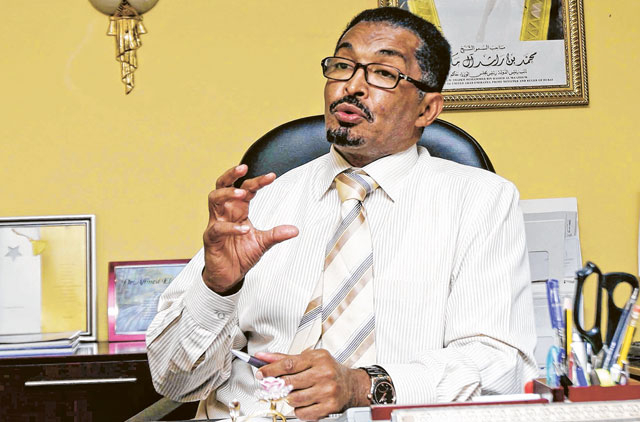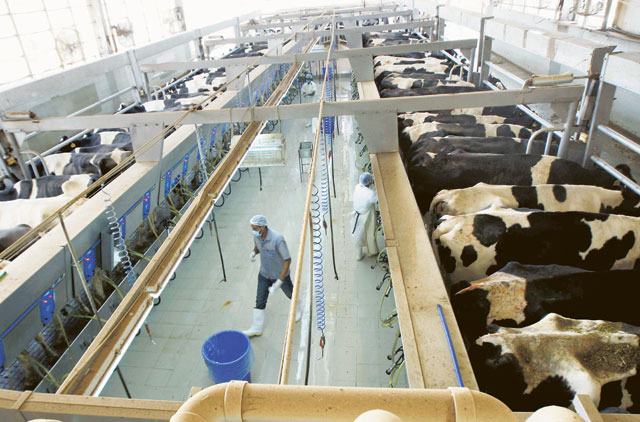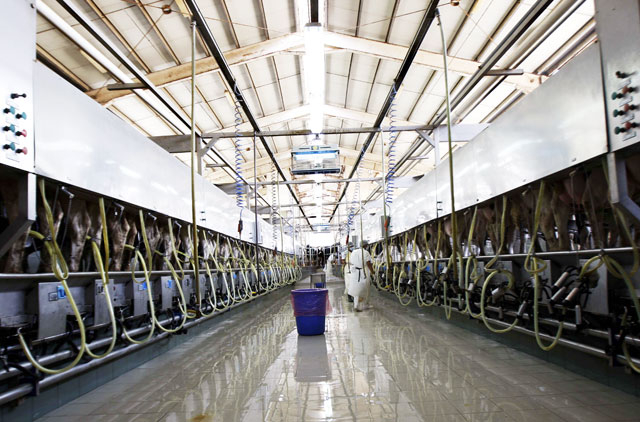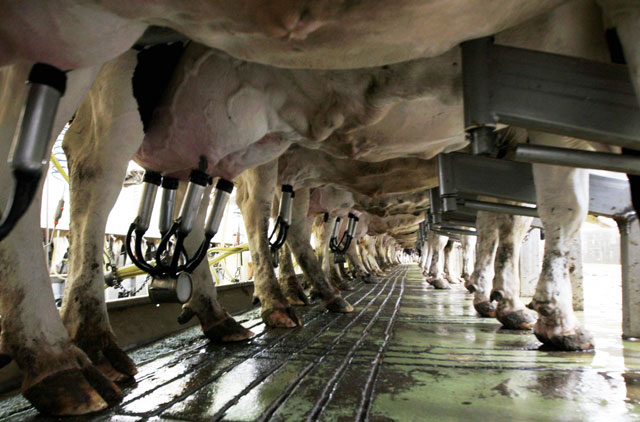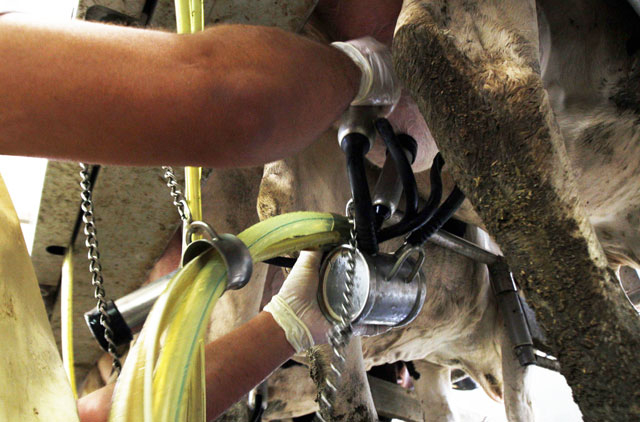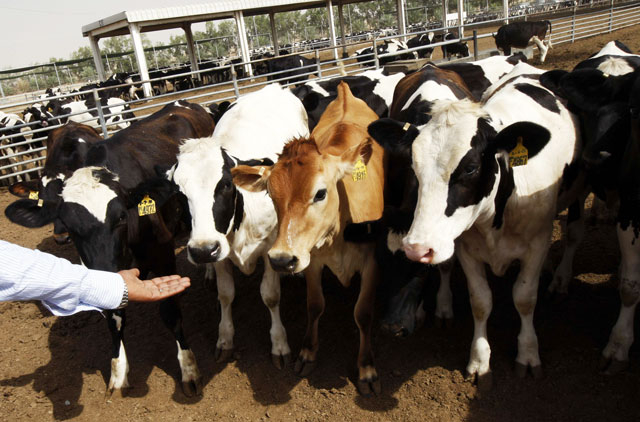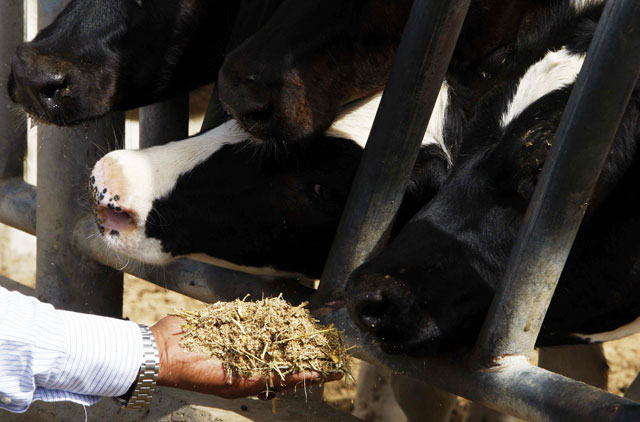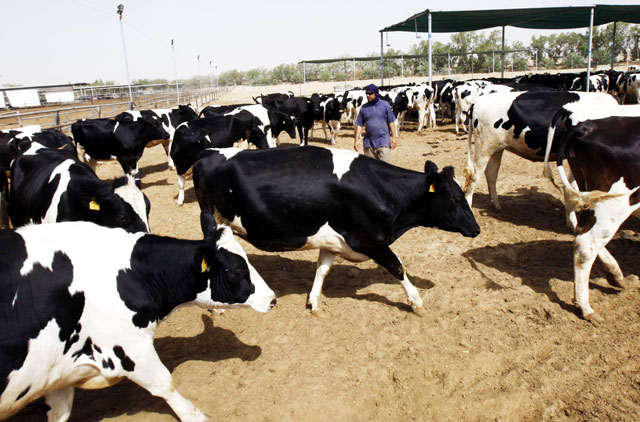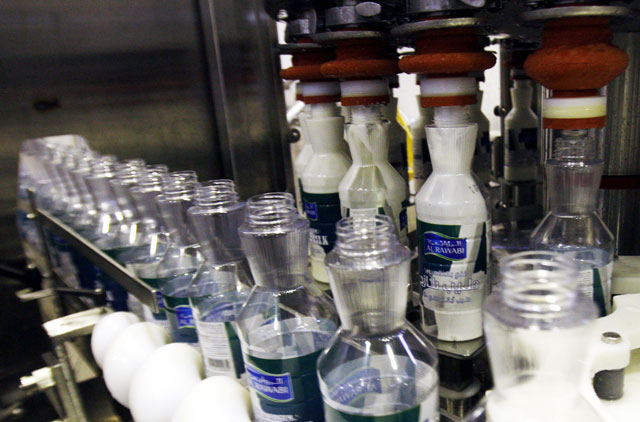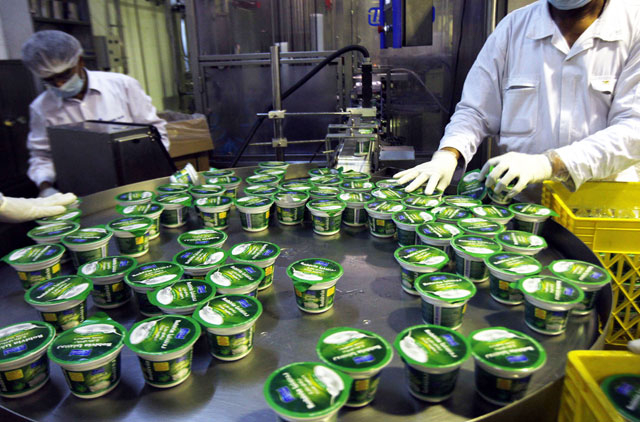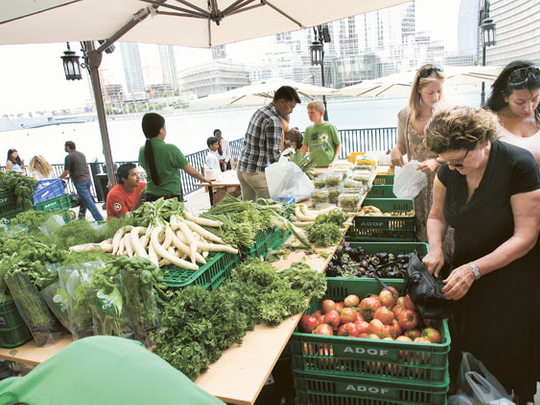
Dubai: Public demand for fresh locally grown basic food staples in the United Arab Emirates is rising and commercial farming ventures new and old are scrambling to keep up with the pace.
And despite arid desert conditions and limited water supplies, a small domestic food and beverage industry is working around the clock to not only meet demand but prepare for future expansion.
The United Nations Food and Agriculture Organisation (FAO) Statistical Yearbook 2010 states yearly production of staple vegetables in the UAE from 2007-2009.
In the three most recent years listed, the UAE farming community is estimated to have produced 485,000 tonnes of vegetables in total a year from 10,000 hectares of land cultivated for growing, according to the FAO.
In a country that imports 85 per cent of its foodstuffs, small pockets of consumers are flocking to venues that offer farm-fresh vegetables, milk, poultry and eggs from growing operations and dairies only a short drive out of big cities such as Dubai.
The bustling press of morning patrons descending on the dozen or so outdoor stalls of the Farmers' Market on the Terrace at Souq Bahar each Friday is testimony to pent-up demand by health-conscious consumers.
The rich smells of ripe, colourful and fresh tomatoes, cucumbers, bell peppers, eggplant and freshly cut herbs waft through the market started in November 2010 by Baker & Spice Souq Bahar to give customers an alternative.
Sprawled across the indigo-tiled walkway along the lake, opposite the foot of Burj Khalifa, the farmers market touts regular and organic foods, including live organic chickens and a vast array of rich breads free from chemicals.
Connected to environment
Australian expatriate Janet Richards shops regularly at the market and makes the Friday visit whenever possible to stock up for the week on foods that make her feel whole and connected to the environment.
"This is very important to me to be able to find locally produced vegetables, organic foods that our bodies recognize," Richards said at the Abu Dhabi Organic Foods (Adof) stall while eyeing a six-pack of mottled farm-fresh eggs on the counter.
Green plastic produce trays stamped with the Adof label each have their own stickers to indicate which day of the week foods were harvested.
"It's a real privilege to have access to foods that are harvested and sold at market within hours, especially in a country where so much of what we eat is shipped in from other countries. I'm very grateful for this chance to buy real foods that are good for me," she said.
Richards buys eight giant organic tomatoes, six eggs, two eggplants, a box of cherry tomatoes, a bunch of green onions and some cucumbers.
Unlike Western food outlets which charge high prices for organic food stuffs, she marvels at the affordability of the farmers market.
For her efforts, Richards pays only Dh25 for enough food to stuff her well-used cotton personal shopping bag — not plastic — to the point that is almost overflowing.
Mohammad Al Jamimi, operations manager for Baker & Spice, said the customer response to the inaugural season of the outdoor market at Souq Bahar has been nothing short of remarkable.
The market's last day of the season was held April 15 in preparation of the summer heat now gathering in Dubai but the outdoor food gatherings will return for a second season when cooler weather prevails once again in November, he told Gulf News.
Fresh locally grown produce over the next few months can be purchased inside the Baker & Spice premises on a smaller scale.
"People understand that it is good to buy local. We now have 3,000 to 4,000 people every Friday coming to our market. There is a huge demand for local produce," said Al Jamimi, adding there are "another 25 farms under process" to grow local produce.
Al Jamimi said "in one year, it's been amazing. We started with one farm last year and now we have nine farmers."
High-end fare expands
Domestic markets make room for items such as cultivation of caviar
Dubai: Commercial vegetable farms and dairy operations are not the only ones making plans to expand operations to meet higher consumer demand in the UAE.
Domestic markets are making room for high-end fare such as caviar leading to plans for a new aquaculture project in Abu Dhabi.
Supporting the unusual concept of fish from the desert, the Bin Salem Group has constructed what the firm calls the "largest recirculatory plant for sturgeon" in the world.
As many as 22 adult sturgeon were recently flown from Frankfurt, Germany, to Abu Dhabi and moved to their new home, a newly constructed 60,000 square-metre state of the art farm.
In a statement, the company said that its "first premium caviar is expected to be produced by the end of 2011" and that eventually when 260,000 sturgeons are shipped to the plant, it will have the capacity to produce 32 tonnes of top quality caviar every year.
Fish will be stored in 64 larger tanks, eight tanks for the nursery and 32 storage tanks.
The company said the new Made-in-Abu-Dhabi caviar is important given "the face of the sharp decline in the natural sturgeon population and the ever-growing demand for real caviar — which exceeds the supply by far."
Dr Safdar Mohammad, professor in the Department of Agribusiness at the College of Food and Agriculture at United Arab Emirates University in Al Ain, lauded efforts to expand domestic food markets and production in the country.
Mohammad said expansion is a good thing for the UAE because it boosts food security as a hedge against global famine, earthquakes and bad weather that have plagued the world commodities markets for the last several years.
For the most part, the UAE enjoys basic food security in some agricultural sectors that produce daily food stuffs such as eggs, poultry, milk, bread, vegetables, dates and goat and camel meat.
Each effort to bolster domestic food production is a step in the right direction to help offset enormous growth in imported foods needed to feed a growing population.
Mohammad said statistics show that in 2000, the UAE agri-food imports amounted to $3.6 billion (Dh13.22 billion). Seven years later, "total imports of agri-food products were estimated at $10.4 million…an increase of about 189 per cent."
To counter the dependence on imports, Mohammad said there are several options that can be pursued to ensure that residents have access to nutritious foods at all times throughout the year.
Global stress
One option is to "increase domestic production," another includes diversifying the sources of imports as well as importing food items strategically in good times for storage in sophisticated facilities that can be used in times of global stress.
"When there is enough supply, you can buy it and store it like strategic reserves," he told Gulf News. "The Gulf has the resources to invest in high-tech storage facilities to store grains, corn, and rice with a long shelf life."
Mohammad said there is an estimated 260,000 hectares of cultivated area developed in the UAE that can be used to grow basic crops but the land only represents about 3.1 per cent of the country.
Latest figures, he said, suggest there are more than "38,500 farms in the UAE, up from 21,000 in 1994, producing mainly vegetables, dates and fruits."
However, most of the farms listed are hobby or family farms and do not represent a large commercial agricultural industry although he conceded there may be more commercial enterprises sprouting in the country to meet renewed demand for local produce.
Figures show a marked increase in the production of live animals in the UAE as the country's global prominence grew and more expatriates moved here.
From 1998 to 2004, goat production increased 28.5 per cent from 1.1 million to 1.4 million while cattle production jumped from 85,000 to 115,000 for an increase of 35.3 per cent.
Self-sufficient
The local raising of chickens jumped from 11,000 to 13,000 by 2004, an 18.2 per cent increase.
The fish and dates sectors enjoy an estimated 100 per cent self sufficiency rate in the UAE, he estimated, while the dairy industry probably stands at about 60 per cent. Vegetable and poultry growers are about 25 per cent self-sufficient.
Acquiring hard accurate figures reflecting agricultural progress in the UAE is difficult, he said, given there is no agricultural census to gauge production.
But Mohammad believes that the domestic agri-food industry has been holding its own and maintaining its overall production outputs for the last several years to the point where some sectors are enjoying some self sufficiency.
United Nations: UAE foods remain stable
The United Nations Food and Agriculture Organisation (FAO) Statistical Yearbook 2010 states production of basic staple foods in the UAE from 2007 to 2009.
- 2009 chicken meat production in the UAE was estimated at 36,000 tonnes, up from 26,000 tonnes in 2007.
- 2009 total milk production in the UAE was listed at 100,000 tonnes compared to 100,000 tonnes two years prior.
- 2009 egg production in the UAE was estimated at 17,000 tonnes compared to the same figure for two years earlier.
- 2009 cattle meat production was estimated at 10,000 tonnes representing no change from 2007.
- 2009 sheep and goat meat production was listed at 22,000 tonnes representing no change from two years before.
Ranking
Top foods From the UAE
The United Nations FAO each year ranks food produced in each country by volume. In the UAE in 2009, top foods grown by the metric tonne were:
1.) Dates, 775,000 mt
2.) Tomatoes, 215,000 mt
3.) Fresh vegetables, 140,000 mt
4.) Camel milk, 40,000 mt
5.) Goat milk, 36,000 mt
6.) Chicken meat, 33,938 mt
7.) Eggplants, 22,000 mt
8.) Pumpkins, squash and gourds, 20,000 mt
9.) Cabbages and other brassicas, 17,500 mt
10.) Cucumbers and gherkins, 17,200 mt
Milk production to grow
Mushrooming demand for freshness certainly isn't confined to vegetables. There has been a surge in demand for dairy products.
Al Rawabi Dairy Co. executives told Gulf News business has never been better at the 250-acre dairy farm operation located in the heart of Dubai's Al Khawaneej, an agricultural haven draped in lush greenery fed by vast underground aquifers.
Dr Ahmad Eltigani Al Mansouri, general manager of Al Rawabi Dairy Co, said the firm has evolved a great deal since its founding in 1991 when it began operations with 500 dairy cows and produced 10,000 litres of fresh milk a day.
Today, Al Rawabi Dairy touts a herd of 10,000 Holstein and Freisian dairy cows from Australia, Holland, Germany and born locally thanks to the firm's breeding programme.
Of the total herd, 7,000 are milked three times a day at the firm's modern milking parlour to produce 250,000 litres a day of milk that hits stores in Dubai within hours of packaging at the company bottling plant.
The governing market force on which Al Rawabi founded its highly popular brand is that for the most part, fresh milk — unlike sterilised or powder milk — needs to be generated locally given its limited shelf life. "You cannot import fresh milk. It is only good for four days. Residents of the UAE like [it to be as] fresh as possible," Al Mansouri said from his spacious office at the dairy operation.
The relative closeness of the dairy to city markets enables freshly produced milk to be shipped quickly to retail outlets where milk, as a basic food staple, quickly sells out. "This gives us an advantage to our competitors," he said.
Demand by Al Rawabi consumers has steadily increased by 20 per cent every year for the last five years, he said, pushing the company to consider expansion plans.
"We are always expanding — the population of this country is increasing every year. The standard of living is increasing and people want more milk, more eggs," said Al Mansouri. "To grow year on year, we have to grow our number of cows. We are acquiring 2,000 new cows by the end of this year."
The longer view will see Al Rawabi expand even further with plans to open a brand new dairy farm in the Liwa area, south of Abu Dhabi on the border with Saudi Arabia.
The new farm would see the addition of another 5,000 dairy cows and would enable Al Rawabi to produce and deliver to south western areas of the country. By 2015, expansion plans by Al Rawabi should see the company's national daily production of fresh milk increase to 500,000 litres a day from a total herd of 20,000 dairy cows.
Al Mansouri said there are two big challenges to operating a large dairy herd in arid conditions.
Securing the 13 ingredients mixed for the daily cow fodder is an extensive exercise in which the company attempts to buy directly when it can and then imports it.
Alfalfa from Spain, the US, Egypt and Sudan; sugar beet pulp from Egypt and China; soya beans from India; cotton seed and corn from Africa are all mixed into the daily food menu.
Keeping cash cows cool during hot months of the year is also paramount.
Challenges
"The other challenge we have here is high temperatures and humidity," Al Mansouri said. "We have invested a lot of money in cooling systems imported from Arizona and Florida."
During hotter months, cows enjoy dehumidified outdoor sheds that keep cool air inside using large curtains on the exterior.
Keeping dairy cattle comfortable and well fed with high-quality fodder has helped Al Rawabi remain competitive by producing high-fat milk that is up to 3.7 per cent milk fat.
"Some of our best cows can produce 63 litres a day," he said, although the average cow produces around 35 litres of milk.
With the herd reaching a critical mass, Al Mansouri said there will come a day when the company's breeding programme can spread the genetic potential of its best cows through in-vitro fertilisation to produce higher quality yield over the years.
The company is also expanding by reaching out into other sectors of the dairy industry as evidenced by its recent introduction to its dairy product line of B-Activ drinking yoghurt which contains probiotic bacteria that are reported to promote intestinal health among consumers.


